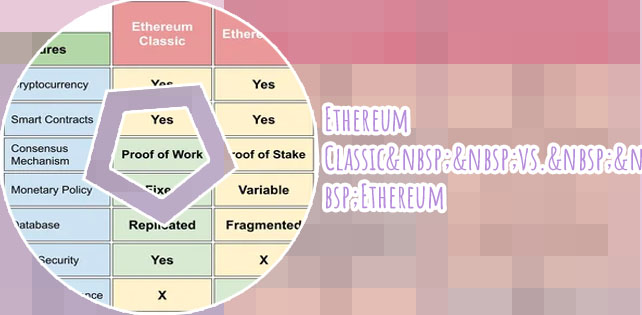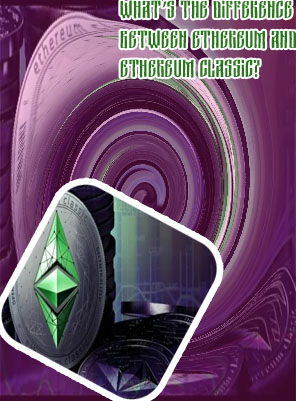Etherium vs etherium classic

When it comes to the debate between Ethereum and Ethereum Classic, there are various factors to consider. Both cryptocurrencies have their own unique characteristics and differences that distinguish them from each other. To gain a better understanding of the differences between Ethereum and Ethereum Classic, please refer to the following articles:
Ethereum vs Ethereum Classic: Understanding the Key Differences

Today, we sat down with cryptocurrency expert to discuss the key differences between Ethereum and Ethereum Classic.
Expert: "Ethereum and Ethereum Classic are both popular cryptocurrencies, but they have some fundamental differences. The main difference lies in their origins. Ethereum Classic is actually a split from the original Ethereum blockchain. This split occurred after a hard fork in the Ethereum network due to a hacking incident. Those who disagreed with the decision to reverse the hack continued to mine the original chain, giving birth to Ethereum Classic."
Expert: "Another key difference between the two is their approach to governance. Ethereum has a more centralized governance model, with a foundation overseeing the development of the platform. On the other hand, Ethereum Classic operates more on a decentralized community-driven approach."
Expert: "In terms of community support and market capitalization, Ethereum is far ahead of Ethereum Classic. Ethereum has a larger user base, more developers, and a higher market capitalization. However, some enthusiasts prefer Ethereum Classic for its immutability and adherence to the original ethos of decentralization."
This article is important for those looking to understand the differences between Ethereum and Ethereum Classic. By knowing the key distinctions, investors and users can make informed decisions about which platform aligns best with their values and goals in the world of cryptocurrencies
The History and Evolution of Ethereum and Ethereum Classic
Ethereum, a decentralized platform that enables smart contracts and distributed applications to be built and operated without any downtime, fraud, control, or interference from a third party, has made significant waves in the world of cryptocurrency since its inception in 2015. Ethereum's native cryptocurrency, Ether, is now one of the most widely traded coins on the market and has helped to propel the platform to new heights.
One of the most notable aspects of Ethereum is its ability to facilitate not only financial transactions but also a wide range of digital agreements and applications. This has led to the development of decentralized applications (dApps) that are revolutionizing industries such as finance, real estate, gaming, and more.
Ethereum's history has not been without its challenges, however. In 2016, a controversial hard fork resulted in the creation of Ethereum Classic, a separate blockchain that upheld the original Ethereum chain. Despite this split, both Ethereum and Ethereum Classic continue to be used and traded by individuals and businesses around the world.
One practical use case of Ethereum's smart contract functionality is in supply chain management. By using Ethereum's blockchain technology, companies can track the movement of goods from production to delivery, ensuring transparency and reducing the risk of fraud. This has resulted in increased efficiency and trust among
Menu
- Crypto exchange
- Dogebtc
- Etherium vs etherium classic
- Cryptocurrency bitcoin price
- How to transfer money from cryptocom to bank account
- Where to buy crypto
- Most viewed crypto
- What the hell is bitcoin
- What is a bitcoin halving
- How to add bank account to cryptocom
- How to withdraw money from cryptocom
- How do you buy cryptocurrency
- Weth crypto
- Highest bitcoin price ever
- Apps cryptocurrency
- Bitcoin cryptocurrency
- Crypto com nft
- Should i buy bitcoin before halving
- Create cryptocurrency
- Bit coin diamond
- When to buy bitcoin
- Best crypto news websites
- Who has the most btc
- Dogecoin to a dollar
- Cryptocurrency exchanges
- Can i buy dogecoin on cash app
- Free crypto coinbase
- Cryptocom xrp
- Litecoin price today
- How does bit coin work
- Where to buy ethereum
- Buy crypto with credit card
- Where to buy shiba inu crypto
- What is usdm on cryptocom
- Where to buy catgirl crypto
- Crypto com not letting me buy
- Baby dogecoin price chart
- Safemoon crypto com
- When will all btc be mined
- Which crypto to buy right now
- Today's bitcoin cash price
- The crypto
- Top cryptos
- How much bitcoin should i buy to start
- Cryptocoin com coin
- Cryptocurrency prices
- Bonfire crypto price
- How much is pi crypto worth
- Coindesk bitcoin price
- What is btc wallet
- Buy bitcoin cash
- What app can i buy dogecoin
- Buy dogecoin stock coinbase
- How to buy dogecoin on iphone
- Crypto com not working
- Cryptocurrency to buy
- Ethusd price
- To invest all profits in crypto
- Mana crypto price
- Cryptocom card
- Ethereum crypto
- Ethereum bitcoin wallets
- Bit price
- Crypto wallet app


